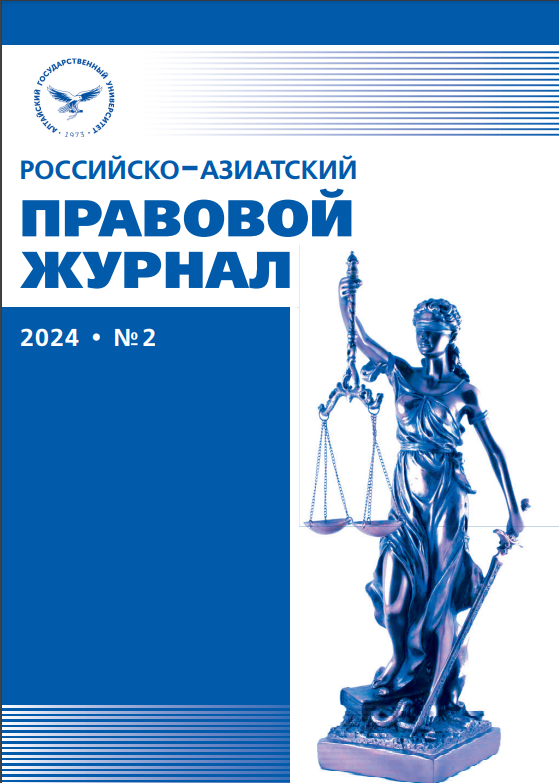ТЕОРЕТИЧЕСКАЯ МОДЕЛЬ УГОЛОВНОЙ ОТВЕТСТВЕННОСТИ ЗА НЕЗАКОННОЕ ПРЕДПРИНИМАТЕЛЬСТВО
УДК 34 ББК 67.75
Abstract
xThe article examines the history of the development of criminal liability for illegal entrepreneurshipin Russian legislation, the criminal legal characteristics of the crime under Art. 171 of the Criminal Codeof the Russian Federation. The author analyzes the controversial issues of determining the social danger ofillegal entrepreneurship and highlights law enforcement problems. Based on the results of the study, modelprovisions for criminal liability for illegal business activities are proposed, based on the provision that thereis no necessary and sufficient for the criminalization of a public danger of an act carried out by carrying outbusiness activities without registration. The author also argues the provisions on the actual impossibilityof bringing to criminal liability for carrying out activities in the absence of accreditation in the nationalaccreditation system due to the lack of mandatory requirements for such activities. The above allows us to conclude that such a method of carrying out the objective side of illegal entrepreneurship does not meet thecriterion of public danger, and the norm in question in this part will be subject to adjustment.
Downloads
References
Спектор Е.И. Развитие административного законодательства о регистрации // Журнал российского права. 2002. №7. С. 36.
Бахрах Д.Н., Россинский Б.В., Старилов Ю.Н. Административное право : учебник для вузов. М., 2005. С. 580.
Панова И.В. Административный процесс в РФ: понятие, принципы, виды // Правоведение. 2000. №2. С. 117.
Постановление ФАС Дальневосточного округа от 17.01.2007 г. № Ф03-А37/05–1/4544; Постановление Арбитражного суда Западно-Сибирского округа от 29.07.2021 г. № Ф04 -3953/2021 по делу № А45–21920/2019; Постановление Арбитражного суда Северо-Кавказского округа от 12.02.2019 № Ф08–11958/2018 по делу № А63–3352/2017
Коровинских С. Уголовная ответственность за незаконное предпринимательство // Российская юстиция. 2000. №4. С. 43.
Мерзлякова А.В. Объект незаконного предпринимательства // Экономика, предпринимательство и право. 2016. Т. 6. №2. С. 191.
Шувалов И.И. Проблемы определения пределов свободы усмотрения субъектов предпринимательской деятельности // Журнал российского права. 2021. №6. С. 68.
Коржов В.Ю., Слепенкова О.А., Бевзюк Е.А., Хлистун Ю.В., Шишелова С.А., Юдина А.Б., Агешкина Н.А. Комментарий к Федеральному закону от 28.12.2013 г. №412-ФЗ «Об аккредитации в национальной системе аккредитации» (постатейный).
Левитин В.Б. Понятие незаконной самозанятости: уголовно-правовой и криминологический аспекты // Российский следователь. 2018. №10. С. 42.
Спектор Е.И. Правовые иллюзии и реалии Федерального закона «О лицензировании отдельных видов деятельности» // Законодательство и экономика. 2011. №7. С. 23.
Copyright (c) 2024 А.А. Коренная

This work is licensed under a Creative Commons Attribution 4.0 International License.
Russian-Asian Law Journal is a golden publisher, as we allow self-archiving, but most importantly we are fully transparent about your rights.
Authors may present and discuss their findings ahead of publication: at scientific conferences, on preprint servers, in public databases, and in blogs, wikis, tweets, and other informal communication channels.
Russian-Asian Law Journal allows authors to deposit manuscripts (currently under review or those for intended submission) in non-commercial, pre-print servers such as ArXiv.
Authors who publish with this journal agree to the following terms:
- Authors retain copyright and grant the journal right of first publication with the work simultaneously licensed under a Creative Commons Attribution License that allows others to share the work with an acknowledgement of the work's authorship and initial publication in this journal.
- Authors are able to enter into separate, additional contractual arrangements for the non-exclusive distribution of the journal's published version of the work (e.g., post it to an institutional repository or publish it in a book), with an acknowledgement of its initial publication in this journal.
- Authors are permitted and encouraged to post their work online (e.g., in institutional repositories or on their website) prior to and during the submission process, as it can lead to productive exchanges, as well as earlier and greater citation of published work (See The Effect of Open Access).








